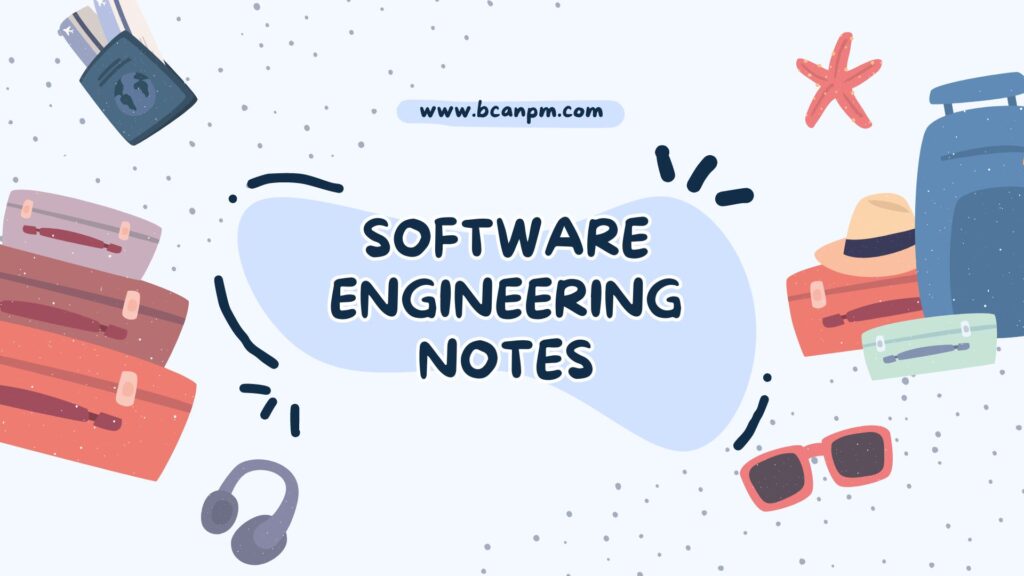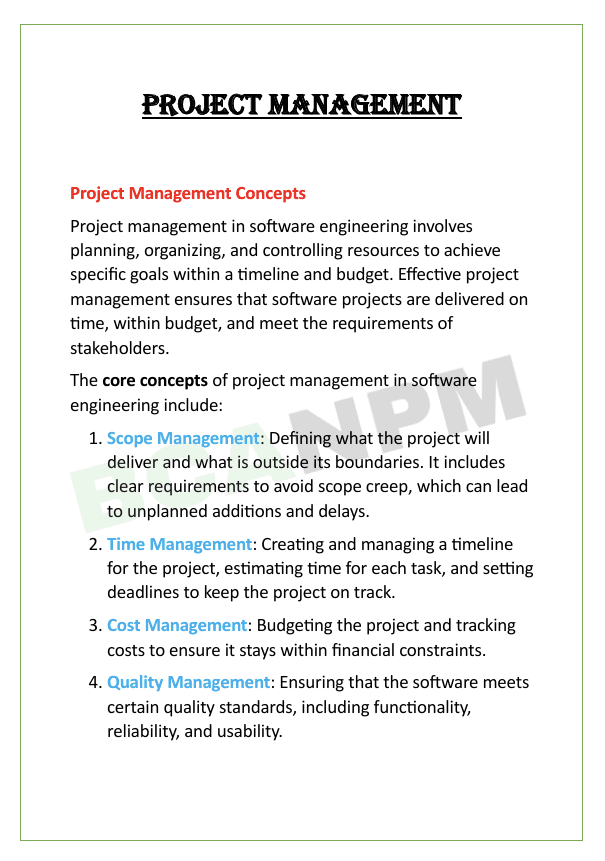
Free Download Software Engineering Notes in pdf – Bca 4th Semester. High quality, well-structured and Standard Notes that are easy to remember.
Welcome to Bcanpm.com
Bcanpm provides standard or well-structured Bca Notes for students. The notes are free to download. Each semester notes of Bca are available on www.bcanpm.com. In this post you can download Software Engineering Notes (C 8 ). All units are available to download for free.
Software Engineering Notes Unit 1 – 6

Unit 1: Software Development Life Cycle
“The Software Development Life Cycle (SDLC)” is a structured process for designing, developing, testing, deploying and maintaining software.

Unit 2: Project Management
“Project Management” is the practice of planning, executing, and overseeing projects to achieve specific goals within defined constraints such as time, budget and scope.

Unit 3: System Design
“System Design” is the process of defining the architecture, components, modules, interfaces and data flow of a system to meet specified requirements.

Unit 4: Coding
“Coding” is the process of writing instructions in a programming language to create software, applications or systems that perform specific tasks.

Unit 5: Software Testing
“Software Testing” is the process of evaluating a software application to identify defects, ensure functionality and verify that it meets specified requirements.
Syllabus of Software Engineering
Unit 1: Introduction to Software Engineering
- Definition and Scope: Understanding what software engineering is and its importance.
- Software Processes: Overview of various software development life cycle (SDLC) models like Waterfall, Agile, Spiral, and V-Model.
- Software Project Management: Basic concepts of project management including planning, scheduling, and tracking.
Unit 2: Software Requirements
- Requirements Engineering: Techniques for gathering and analyzing requirements.
- Requirements Documentation: Writing Software Requirement Specifications (SRS).
- Functional and Non-Functional Requirements: Differentiating between these types of requirements.
Unit 3: Software Design
- Design Concepts: Principles of software design including abstraction, modularity, and encapsulation.
- Architectural Design: High-level structuring of software systems using architectural styles and patterns.
- Detailed Design: Creating detailed designs using UML diagrams such as class diagrams, sequence diagrams, etc.
Unit 4: Software Construction
- Coding Practices: Best practices for writing clean, maintainable code.
- Programming Paradigms: Overview of different paradigms such as procedural, object-oriented, and functional programming.
- Code Documentation and Comments: Importance of documenting code and writing meaningful comments.
Unit 5: Software Testing
- Testing Fundamentals: Types of testing (unit, integration, system, acceptance).
- Testing Strategies: Different strategies for effective testing including black-box and white-box testing.
- Test Automation: Introduction to automated testing tools and frameworks.
Unit 6: Software Maintenance and Evolution
- Maintenance Types: Different types of software maintenance like corrective, adaptive, perfective, and preventive.
- Software Evolution: The concept of software evolution and managing changes over time.
- Legacy Systems: Handling and modernizing legacy systems.
Unit 7: Software Quality Assurance
- Quality Concepts: Understanding software quality and quality attributes.
- Quality Assurance Processes: Techniques and processes for ensuring software quality.
- Metrics and Measurement: Using metrics to measure software quality and performance.
Unit 8: Advanced Topics in Software Engineering
- Software Reuse: Techniques for reusing software components to improve efficiency.
- Component-Based Software Engineering: Building software from existing components.
- Service-Oriented Architecture (SOA): Designing software systems as a set of services.
- Emerging Trends: Current trends and future directions in software engineering like DevOps, Microservices, etc.